Professional Communication Skills in Nursing: An Essay
VerifiedAdded on 2023/01/20
|6
|1461
|48
Essay
AI Summary
This essay delves into the critical role of professional communication in nursing, emphasizing its impact on developing therapeutic relationships with patients. It highlights the significance of effective verbal and non-verbal communication skills, patient-centered care principles, and accurate documentation in ensuring patient safety and well-being. The essay analyzes a case study, demonstrating how nurses utilize these skills to address patients' needs, promote understanding, and facilitate positive health outcomes. It also explores the application of various communication techniques, such as reflection, clarification, and active listening, to build trust and rapport. The essay underscores the importance of individualized care, considering patients' unique circumstances and needs, to create a supportive and comfortable environment. Furthermore, it emphasizes the collaborative nature of nursing, involving referrals to other healthcare professionals to meet the comprehensive needs of the patient. Ultimately, the essay underscores the nurse's responsibility in meeting patient needs through professional communication, patient-centered care, and proper documentation.
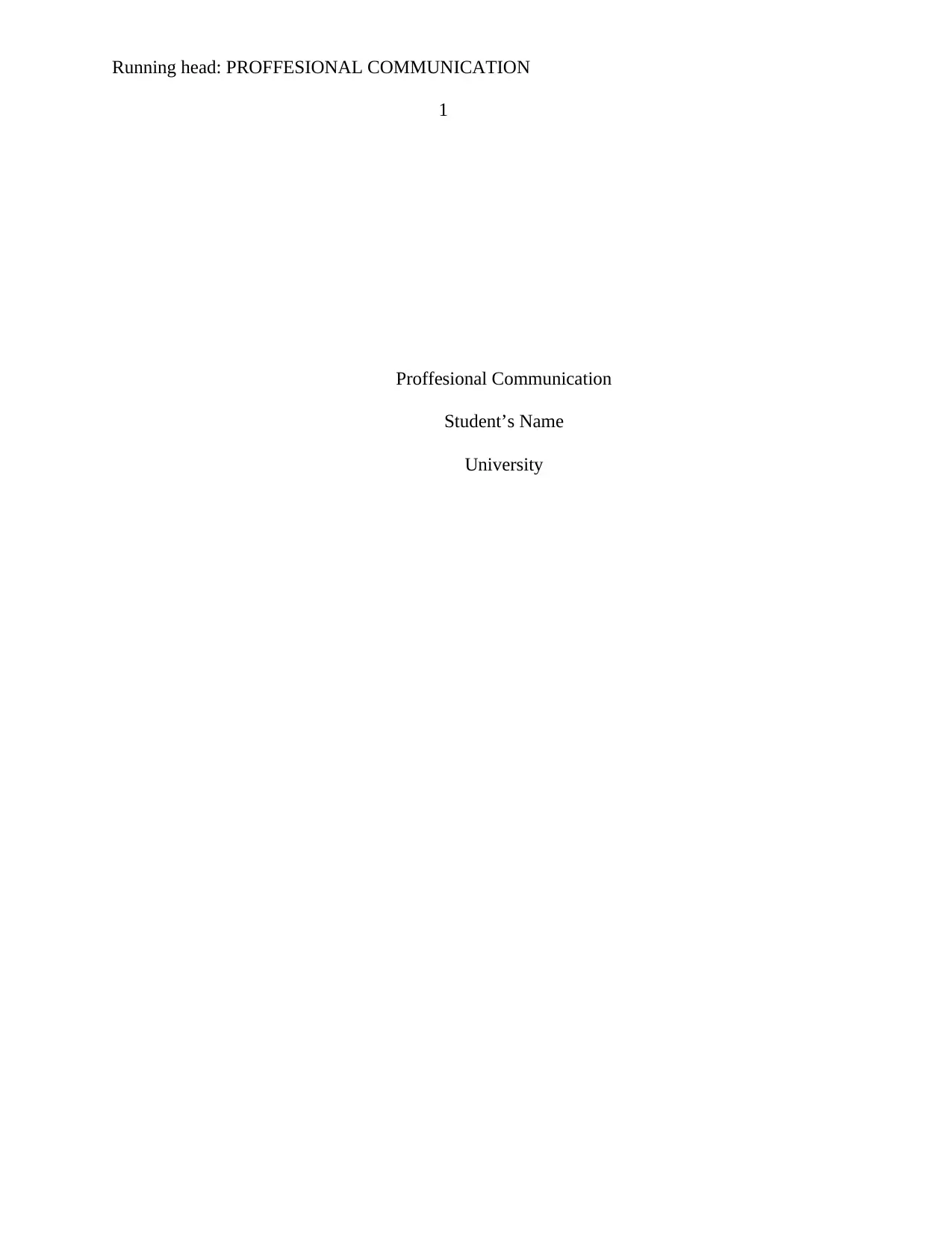
Running head: PROFFESIONAL COMMUNICATION
1
Proffesional Communication
Student’s Name
University
1
Proffesional Communication
Student’s Name
University
Paraphrase This Document
Need a fresh take? Get an instant paraphrase of this document with our AI Paraphraser
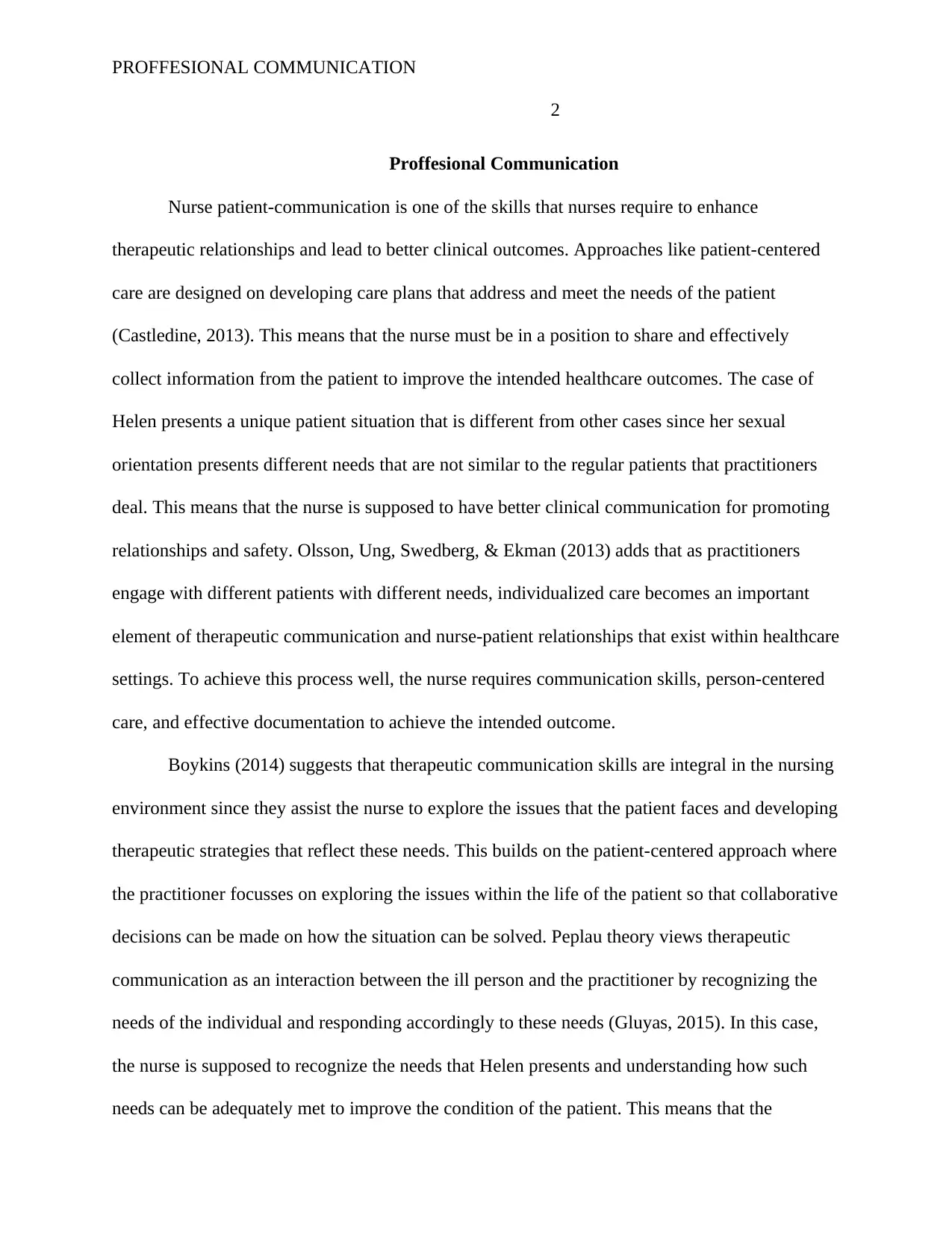
PROFFESIONAL COMMUNICATION
2
Proffesional Communication
Nurse patient-communication is one of the skills that nurses require to enhance
therapeutic relationships and lead to better clinical outcomes. Approaches like patient-centered
care are designed on developing care plans that address and meet the needs of the patient
(Castledine, 2013). This means that the nurse must be in a position to share and effectively
collect information from the patient to improve the intended healthcare outcomes. The case of
Helen presents a unique patient situation that is different from other cases since her sexual
orientation presents different needs that are not similar to the regular patients that practitioners
deal. This means that the nurse is supposed to have better clinical communication for promoting
relationships and safety. Olsson, Ung, Swedberg, & Ekman (2013) adds that as practitioners
engage with different patients with different needs, individualized care becomes an important
element of therapeutic communication and nurse-patient relationships that exist within healthcare
settings. To achieve this process well, the nurse requires communication skills, person-centered
care, and effective documentation to achieve the intended outcome.
Boykins (2014) suggests that therapeutic communication skills are integral in the nursing
environment since they assist the nurse to explore the issues that the patient faces and developing
therapeutic strategies that reflect these needs. This builds on the patient-centered approach where
the practitioner focusses on exploring the issues within the life of the patient so that collaborative
decisions can be made on how the situation can be solved. Peplau theory views therapeutic
communication as an interaction between the ill person and the practitioner by recognizing the
needs of the individual and responding accordingly to these needs (Gluyas, 2015). In this case,
the nurse is supposed to recognize the needs that Helen presents and understanding how such
needs can be adequately met to improve the condition of the patient. This means that the
2
Proffesional Communication
Nurse patient-communication is one of the skills that nurses require to enhance
therapeutic relationships and lead to better clinical outcomes. Approaches like patient-centered
care are designed on developing care plans that address and meet the needs of the patient
(Castledine, 2013). This means that the nurse must be in a position to share and effectively
collect information from the patient to improve the intended healthcare outcomes. The case of
Helen presents a unique patient situation that is different from other cases since her sexual
orientation presents different needs that are not similar to the regular patients that practitioners
deal. This means that the nurse is supposed to have better clinical communication for promoting
relationships and safety. Olsson, Ung, Swedberg, & Ekman (2013) adds that as practitioners
engage with different patients with different needs, individualized care becomes an important
element of therapeutic communication and nurse-patient relationships that exist within healthcare
settings. To achieve this process well, the nurse requires communication skills, person-centered
care, and effective documentation to achieve the intended outcome.
Boykins (2014) suggests that therapeutic communication skills are integral in the nursing
environment since they assist the nurse to explore the issues that the patient faces and developing
therapeutic strategies that reflect these needs. This builds on the patient-centered approach where
the practitioner focusses on exploring the issues within the life of the patient so that collaborative
decisions can be made on how the situation can be solved. Peplau theory views therapeutic
communication as an interaction between the ill person and the practitioner by recognizing the
needs of the individual and responding accordingly to these needs (Gluyas, 2015). In this case,
the nurse is supposed to recognize the needs that Helen presents and understanding how such
needs can be adequately met to improve the condition of the patient. This means that the
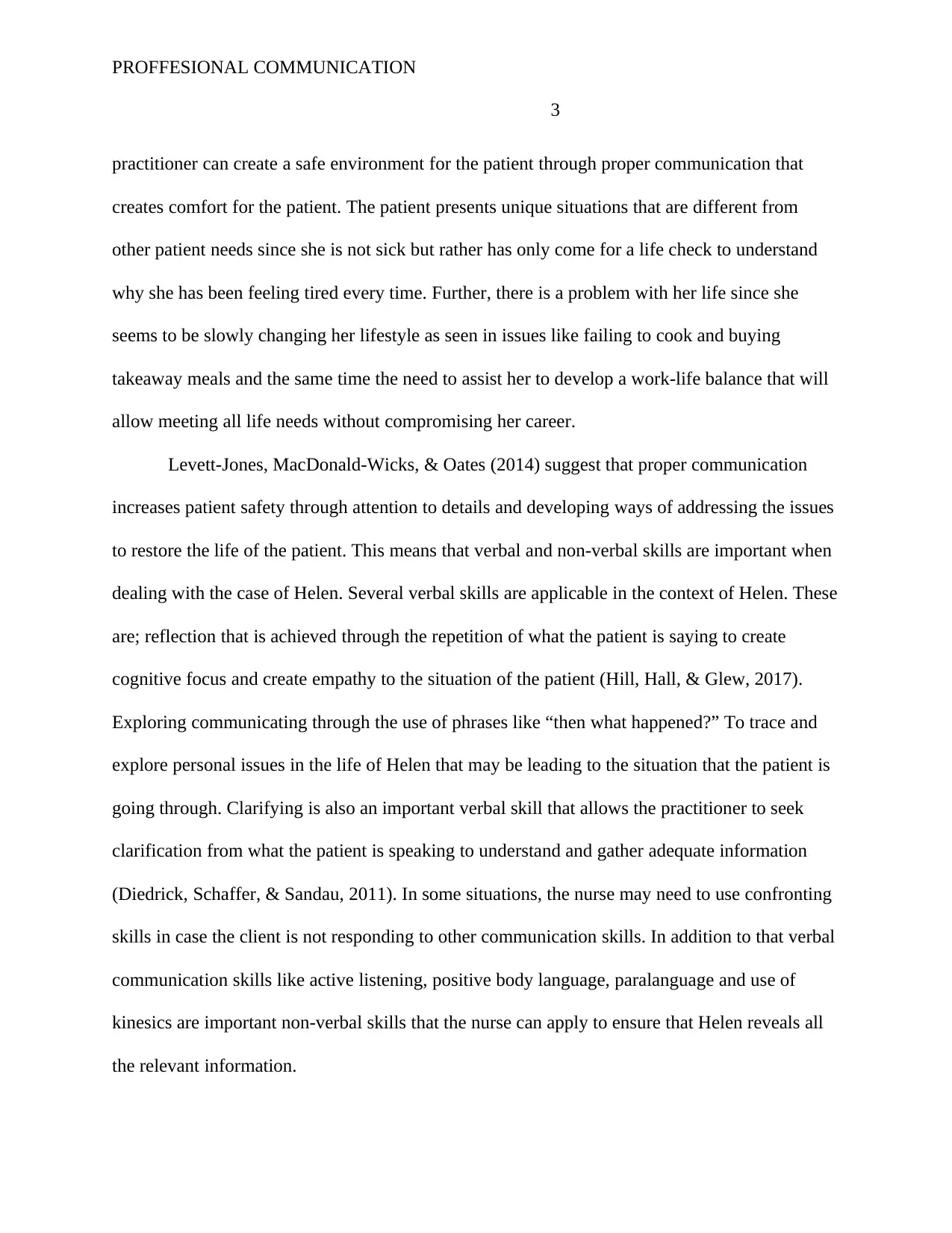
PROFFESIONAL COMMUNICATION
3
practitioner can create a safe environment for the patient through proper communication that
creates comfort for the patient. The patient presents unique situations that are different from
other patient needs since she is not sick but rather has only come for a life check to understand
why she has been feeling tired every time. Further, there is a problem with her life since she
seems to be slowly changing her lifestyle as seen in issues like failing to cook and buying
takeaway meals and the same time the need to assist her to develop a work-life balance that will
allow meeting all life needs without compromising her career.
Levett-Jones, MacDonald-Wicks, & Oates (2014) suggest that proper communication
increases patient safety through attention to details and developing ways of addressing the issues
to restore the life of the patient. This means that verbal and non-verbal skills are important when
dealing with the case of Helen. Several verbal skills are applicable in the context of Helen. These
are; reflection that is achieved through the repetition of what the patient is saying to create
cognitive focus and create empathy to the situation of the patient (Hill, Hall, & Glew, 2017).
Exploring communicating through the use of phrases like “then what happened?” To trace and
explore personal issues in the life of Helen that may be leading to the situation that the patient is
going through. Clarifying is also an important verbal skill that allows the practitioner to seek
clarification from what the patient is speaking to understand and gather adequate information
(Diedrick, Schaffer, & Sandau, 2011). In some situations, the nurse may need to use confronting
skills in case the client is not responding to other communication skills. In addition to that verbal
communication skills like active listening, positive body language, paralanguage and use of
kinesics are important non-verbal skills that the nurse can apply to ensure that Helen reveals all
the relevant information.
3
practitioner can create a safe environment for the patient through proper communication that
creates comfort for the patient. The patient presents unique situations that are different from
other patient needs since she is not sick but rather has only come for a life check to understand
why she has been feeling tired every time. Further, there is a problem with her life since she
seems to be slowly changing her lifestyle as seen in issues like failing to cook and buying
takeaway meals and the same time the need to assist her to develop a work-life balance that will
allow meeting all life needs without compromising her career.
Levett-Jones, MacDonald-Wicks, & Oates (2014) suggest that proper communication
increases patient safety through attention to details and developing ways of addressing the issues
to restore the life of the patient. This means that verbal and non-verbal skills are important when
dealing with the case of Helen. Several verbal skills are applicable in the context of Helen. These
are; reflection that is achieved through the repetition of what the patient is saying to create
cognitive focus and create empathy to the situation of the patient (Hill, Hall, & Glew, 2017).
Exploring communicating through the use of phrases like “then what happened?” To trace and
explore personal issues in the life of Helen that may be leading to the situation that the patient is
going through. Clarifying is also an important verbal skill that allows the practitioner to seek
clarification from what the patient is speaking to understand and gather adequate information
(Diedrick, Schaffer, & Sandau, 2011). In some situations, the nurse may need to use confronting
skills in case the client is not responding to other communication skills. In addition to that verbal
communication skills like active listening, positive body language, paralanguage and use of
kinesics are important non-verbal skills that the nurse can apply to ensure that Helen reveals all
the relevant information.
⊘ This is a preview!⊘
Do you want full access?
Subscribe today to unlock all pages.

Trusted by 1+ million students worldwide
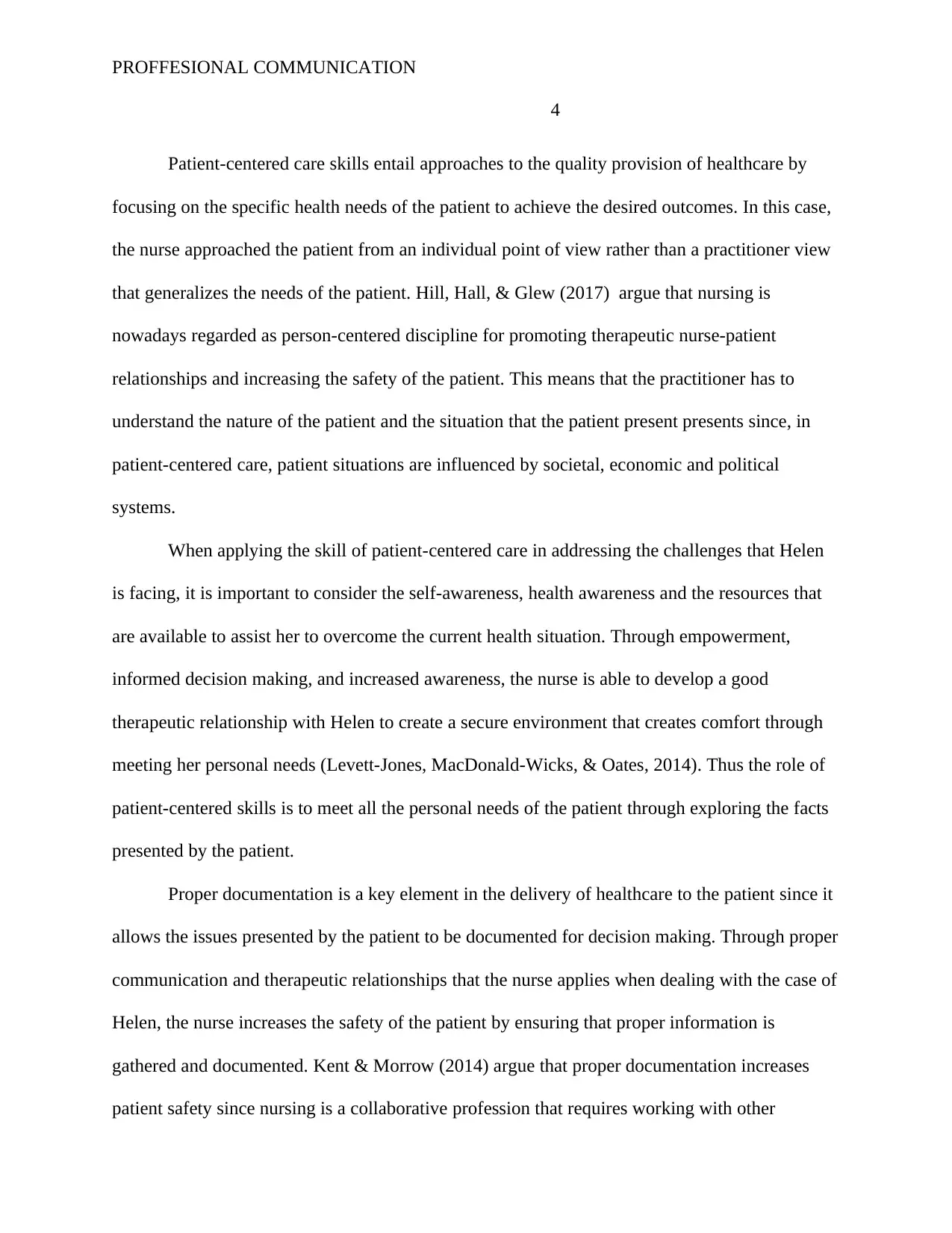
PROFFESIONAL COMMUNICATION
4
Patient-centered care skills entail approaches to the quality provision of healthcare by
focusing on the specific health needs of the patient to achieve the desired outcomes. In this case,
the nurse approached the patient from an individual point of view rather than a practitioner view
that generalizes the needs of the patient. Hill, Hall, & Glew (2017) argue that nursing is
nowadays regarded as person-centered discipline for promoting therapeutic nurse-patient
relationships and increasing the safety of the patient. This means that the practitioner has to
understand the nature of the patient and the situation that the patient present presents since, in
patient-centered care, patient situations are influenced by societal, economic and political
systems.
When applying the skill of patient-centered care in addressing the challenges that Helen
is facing, it is important to consider the self-awareness, health awareness and the resources that
are available to assist her to overcome the current health situation. Through empowerment,
informed decision making, and increased awareness, the nurse is able to develop a good
therapeutic relationship with Helen to create a secure environment that creates comfort through
meeting her personal needs (Levett-Jones, MacDonald-Wicks, & Oates, 2014). Thus the role of
patient-centered skills is to meet all the personal needs of the patient through exploring the facts
presented by the patient.
Proper documentation is a key element in the delivery of healthcare to the patient since it
allows the issues presented by the patient to be documented for decision making. Through proper
communication and therapeutic relationships that the nurse applies when dealing with the case of
Helen, the nurse increases the safety of the patient by ensuring that proper information is
gathered and documented. Kent & Morrow (2014) argue that proper documentation increases
patient safety since nursing is a collaborative profession that requires working with other
4
Patient-centered care skills entail approaches to the quality provision of healthcare by
focusing on the specific health needs of the patient to achieve the desired outcomes. In this case,
the nurse approached the patient from an individual point of view rather than a practitioner view
that generalizes the needs of the patient. Hill, Hall, & Glew (2017) argue that nursing is
nowadays regarded as person-centered discipline for promoting therapeutic nurse-patient
relationships and increasing the safety of the patient. This means that the practitioner has to
understand the nature of the patient and the situation that the patient present presents since, in
patient-centered care, patient situations are influenced by societal, economic and political
systems.
When applying the skill of patient-centered care in addressing the challenges that Helen
is facing, it is important to consider the self-awareness, health awareness and the resources that
are available to assist her to overcome the current health situation. Through empowerment,
informed decision making, and increased awareness, the nurse is able to develop a good
therapeutic relationship with Helen to create a secure environment that creates comfort through
meeting her personal needs (Levett-Jones, MacDonald-Wicks, & Oates, 2014). Thus the role of
patient-centered skills is to meet all the personal needs of the patient through exploring the facts
presented by the patient.
Proper documentation is a key element in the delivery of healthcare to the patient since it
allows the issues presented by the patient to be documented for decision making. Through proper
communication and therapeutic relationships that the nurse applies when dealing with the case of
Helen, the nurse increases the safety of the patient by ensuring that proper information is
gathered and documented. Kent & Morrow (2014) argue that proper documentation increases
patient safety since nursing is a collaborative profession that requires working with other
Paraphrase This Document
Need a fresh take? Get an instant paraphrase of this document with our AI Paraphraser
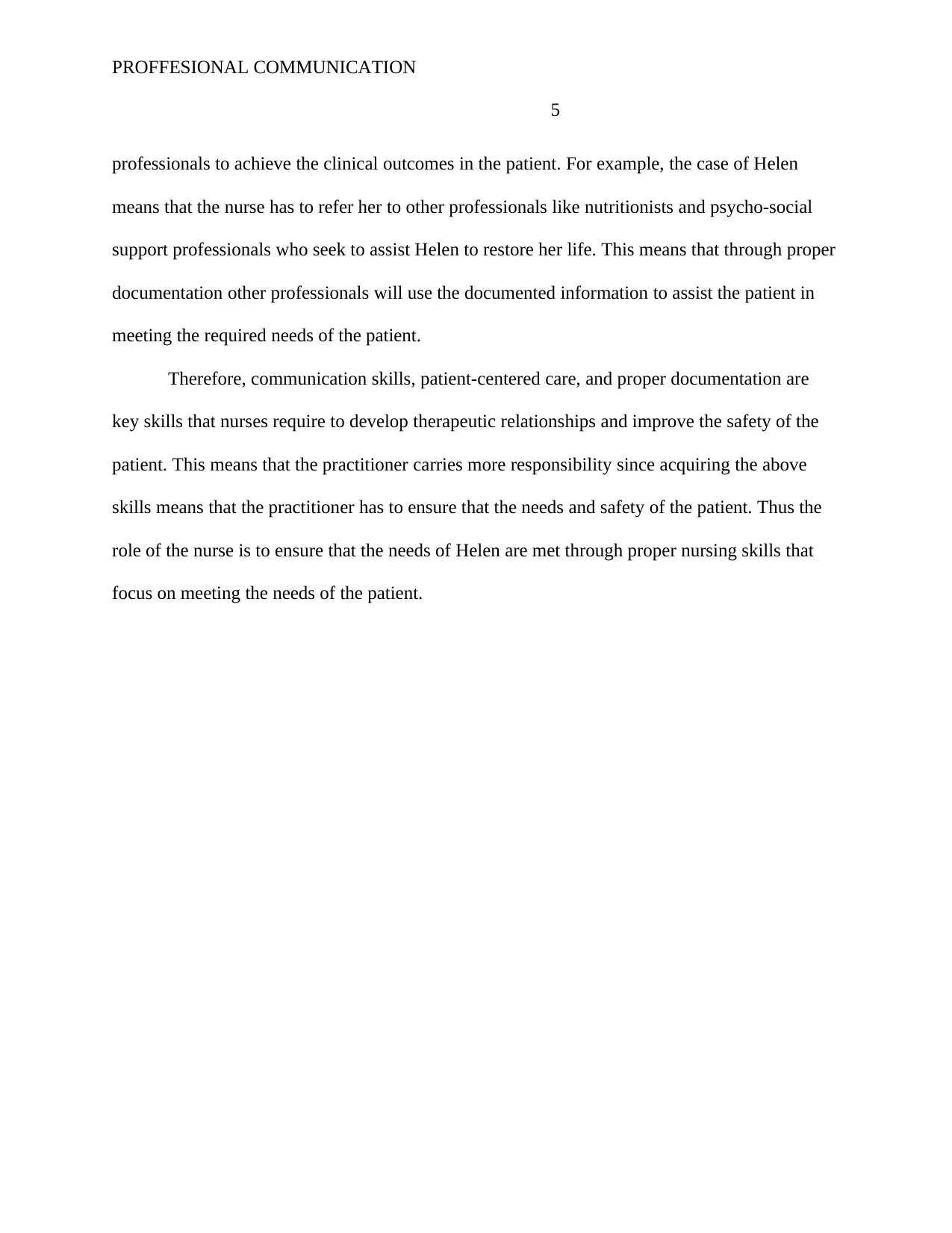
PROFFESIONAL COMMUNICATION
5
professionals to achieve the clinical outcomes in the patient. For example, the case of Helen
means that the nurse has to refer her to other professionals like nutritionists and psycho-social
support professionals who seek to assist Helen to restore her life. This means that through proper
documentation other professionals will use the documented information to assist the patient in
meeting the required needs of the patient.
Therefore, communication skills, patient-centered care, and proper documentation are
key skills that nurses require to develop therapeutic relationships and improve the safety of the
patient. This means that the practitioner carries more responsibility since acquiring the above
skills means that the practitioner has to ensure that the needs and safety of the patient. Thus the
role of the nurse is to ensure that the needs of Helen are met through proper nursing skills that
focus on meeting the needs of the patient.
5
professionals to achieve the clinical outcomes in the patient. For example, the case of Helen
means that the nurse has to refer her to other professionals like nutritionists and psycho-social
support professionals who seek to assist Helen to restore her life. This means that through proper
documentation other professionals will use the documented information to assist the patient in
meeting the required needs of the patient.
Therefore, communication skills, patient-centered care, and proper documentation are
key skills that nurses require to develop therapeutic relationships and improve the safety of the
patient. This means that the practitioner carries more responsibility since acquiring the above
skills means that the practitioner has to ensure that the needs and safety of the patient. Thus the
role of the nurse is to ensure that the needs of Helen are met through proper nursing skills that
focus on meeting the needs of the patient.
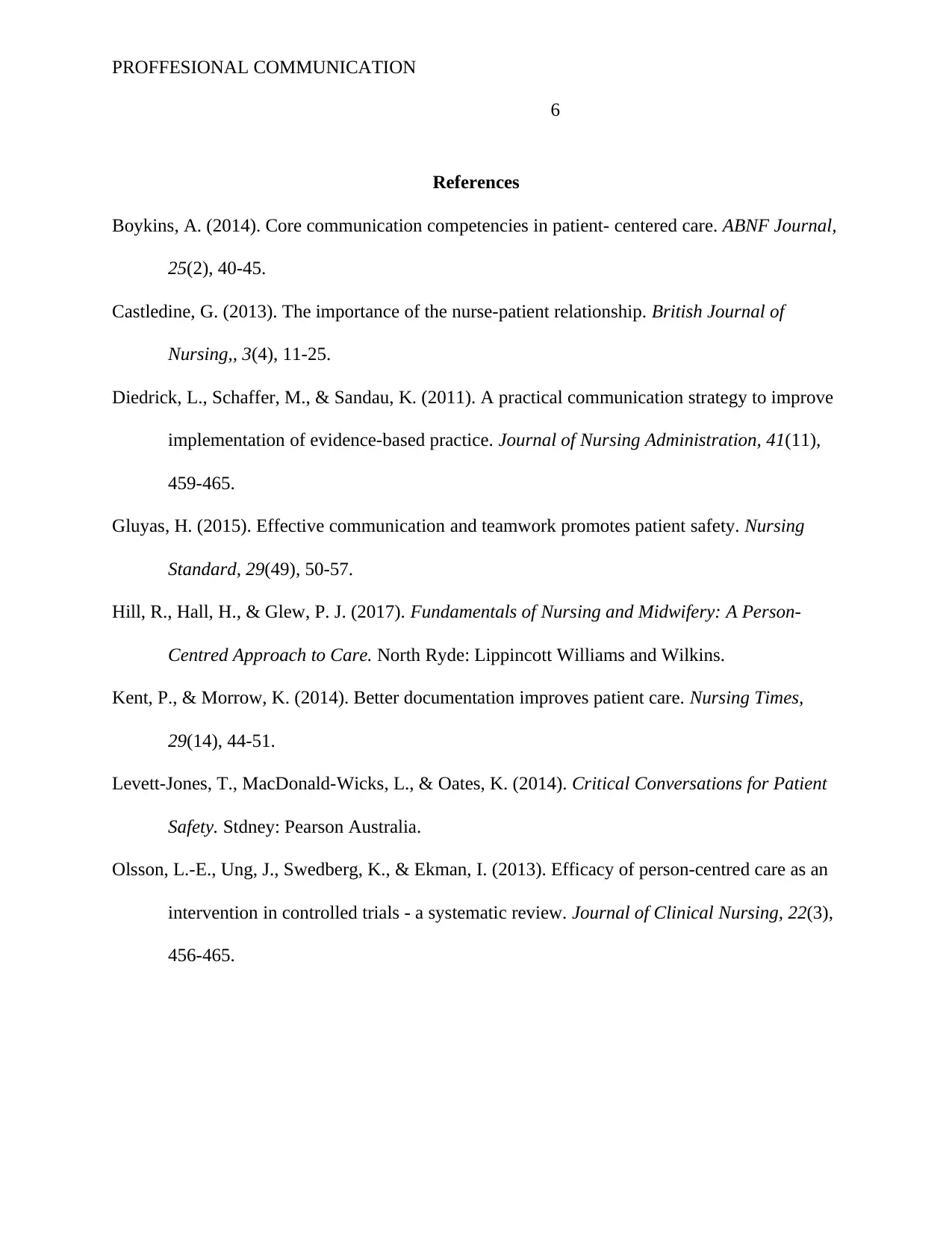
PROFFESIONAL COMMUNICATION
6
References
Boykins, A. (2014). Core communication competencies in patient- centered care. ABNF Journal,
25(2), 40-45.
Castledine, G. (2013). The importance of the nurse-patient relationship. British Journal of
Nursing,, 3(4), 11-25.
Diedrick, L., Schaffer, M., & Sandau, K. (2011). A practical communication strategy to improve
implementation of evidence-based practice. Journal of Nursing Administration, 41(11),
459-465.
Gluyas, H. (2015). Effective communication and teamwork promotes patient safety. Nursing
Standard, 29(49), 50-57.
Hill, R., Hall, H., & Glew, P. J. (2017). Fundamentals of Nursing and Midwifery: A Person-
Centred Approach to Care. North Ryde: Lippincott Williams and Wilkins.
Kent, P., & Morrow, K. (2014). Better documentation improves patient care. Nursing Times,
29(14), 44-51.
Levett-Jones, T., MacDonald-Wicks, L., & Oates, K. (2014). Critical Conversations for Patient
Safety. Stdney: Pearson Australia.
Olsson, L.-E., Ung, J., Swedberg, K., & Ekman, I. (2013). Efficacy of person-centred care as an
intervention in controlled trials - a systematic review. Journal of Clinical Nursing, 22(3),
456-465.
6
References
Boykins, A. (2014). Core communication competencies in patient- centered care. ABNF Journal,
25(2), 40-45.
Castledine, G. (2013). The importance of the nurse-patient relationship. British Journal of
Nursing,, 3(4), 11-25.
Diedrick, L., Schaffer, M., & Sandau, K. (2011). A practical communication strategy to improve
implementation of evidence-based practice. Journal of Nursing Administration, 41(11),
459-465.
Gluyas, H. (2015). Effective communication and teamwork promotes patient safety. Nursing
Standard, 29(49), 50-57.
Hill, R., Hall, H., & Glew, P. J. (2017). Fundamentals of Nursing and Midwifery: A Person-
Centred Approach to Care. North Ryde: Lippincott Williams and Wilkins.
Kent, P., & Morrow, K. (2014). Better documentation improves patient care. Nursing Times,
29(14), 44-51.
Levett-Jones, T., MacDonald-Wicks, L., & Oates, K. (2014). Critical Conversations for Patient
Safety. Stdney: Pearson Australia.
Olsson, L.-E., Ung, J., Swedberg, K., & Ekman, I. (2013). Efficacy of person-centred care as an
intervention in controlled trials - a systematic review. Journal of Clinical Nursing, 22(3),
456-465.
⊘ This is a preview!⊘
Do you want full access?
Subscribe today to unlock all pages.

Trusted by 1+ million students worldwide
1 out of 6
Related Documents
Your All-in-One AI-Powered Toolkit for Academic Success.
+13062052269
info@desklib.com
Available 24*7 on WhatsApp / Email
![[object Object]](/_next/static/media/star-bottom.7253800d.svg)
Unlock your academic potential
Copyright © 2020–2026 A2Z Services. All Rights Reserved. Developed and managed by ZUCOL.





